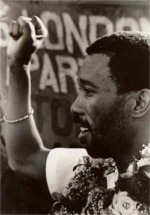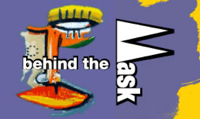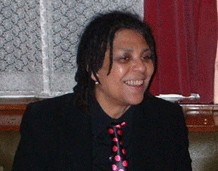
“The closet I have come out of — it is similar to the wardrobe my relieved parents stepped out of when I unlocked the wardrobe after the police had left. If you’re black in South Africa, the inhuman laws of apartheid closet you, if you’re gay in South Africa, the homophobic customs of this society closet you. If you are black and gay in South Africa, well, then it really is the same closet, the same wardrobe. Inside is darkness and oppression. Outside is freedom.” — Simon Nkoli
The African LGBTI (lesbian, gay, bi-sexual, transgender, intersex) movement traces itself back to the last days of apartheid in South Africa. At that time, a number of gay and lesbian anti-apartheid activists, including Simon Nkoli, founded the first black-led LGBTI organization in Africa, the Gay and Lesbian Organization of the Witwatersrand (GLOW). GLOW, which was a multi-racial organisation, was very much at the forefront of campaigning for LGBTI rights to be enshrined in the new South African constitution and the decriminalization of homosexuality.
Apartheid ended 14 years ago and what was a local campaign in South Africa has become a vibrant and progressive Pan-African LGBTI rights movement. The internet has made an enormous difference to the African LGBTI community. Over the past five years, the community has established a strong online presence in the form of news and campaign sites, advocacy, email lists as well as Web 2.0 media such as blogs, forums and Facebook groups. Activists are now in a much better position to make their own demands, including confronting discriminatory attitudes in the international LGBTI movement and calling for more accountability from that movement.
Email and Listservs
Over the past four years, a number of email groups have been formed to provide a safe and secure online space for human rights defenders to communicate privately, organise campaigns and give support to each other. Whenever there has been the need for an immediate regional or continental response to a crisis such as the recent arrest of activists in Uganda, the rape and or murder of lesbians in South Africa, or the trial of gay men in Cameroon, activists have relied on these groups and emails for communicating and mobilizing locally and internationally. Because of the need for security and privacy, email groups remain an important safe space for human rights defenders from across the continent.
News and Advocacy
Behind the Mask (BTM) was set up about eight years ago and was the first dedicated news resource for LGBTI issues in Africa. Its strength lies in its continental focus and up-to-date news. However the news reports are culled from other news sources and lack original commentary and opinion which would make the site more dynamic and interesting. There appears to be a lack of imagination on how to develop the project; for example, they could recruit local activists to report on local issues and include commentary and a discussion element on the site.

Nonetheless BTM’s importance is not just as a source of LGBTI news. Its very presence and the news it reports confirms the existence of a large number of LGBTI people on the continent, which challenges the argument by many religious leaders and governments that “homosexuality is unAfrican.” More recently a number of established organizations have created websites such as Sexual Minorities Uganda (SMUG), Coalition of African Lesbians (CAL) and Gays and Lesbians of Zimbabwe (GALZ), and the Zambian site African Veil, to name a few.
Having a web presence is a “coming out” of LGBTI activism in Africa but the sites are very much organizational in content and do not provide any features to draw in readers and encourage comments and discussion. This is changing as more and more organizations and groups join social networks like Facebook, MySpace and Twitter.
Social Networks
While email groups act as a secure environment to discuss LGBTI issues, more individuals, groups and organzations are beginning to get comfortable with public media such as Facebook and MySpace for advocacy and campaigns. Forum for the Empowerment of Women, BTM and the transgender group Gender Dynamix each have a Facebook group but with little activity. Recently a group called The Killing of Sistahs was set up by a group of activists on Facebook to highlight the rampant murder and rape of lesbians in South Africa. This is the group’s statement on Facebook:
Hands up, how many of you have heard of Matthew Shephard? Yes, that’s right, he was the American gay student who was tortured and killed for being homosexual. Now let’s take it closer to home. Hands up, who has heard of Madoe Mafubedu? No takers? It seems our community isn’t noticing what’s going on in our own backyard. OK then, she was an openly lesbian, 16-year-old who was repeatedly raped and stabbed until she died.
Killing of Sistahs has by far the largest membership and is the most active of all the groups, possibly because there is a specific focus — violence against lesbians in South Africa, whereas the other groups are organizationally focused rather than issue-led.
On July 20, the SA Sun published a horrendous homophobic article, Call me names, but GAY is not OK (PDF file), in which the author, Jon Qwelane, likened the marriage of same-sex couples with marriage to a goat. Within 24 hours, the LGBTI community had set up a Facebook group, Appalling Homophobia, released press statements via email, set up various websites and blogs, and started a campaign to insist on an investigation by the SA Human Rights Commission and the Press Office.
Like Killing of Sistahs, this group has a specific focus and is campaign-led. In just two weeks the membership has risen to nearly 3,000. The group is actively involved with calling for the removal of the author and appears to have taken on the role of monitoring homophobia in the South African media. Like any campaign, making a Facebook group meaningful requires commitment from both the organizers and members, and Appalling Homophobia has both of these.
Blogs
One of the limits of news sites such as BTM and advocacy/campaign sites like CAL is they don’t provide commentary and personal experience of LGBTI people. Blogs counter this and though the number of blogs by LGBTI persons on the continent are still few and far between, they are growing. Blogs like Gay Ugandan, Naija Homo, Black Looks (my own blog) and My Haven are crucial because they not only shout the words “I exist” to those who continue to deny the lives of African LGBTI persons, they politicize the personal and make the voice and experience more powerful. As Rants and Raves of a Gay Kenyan Man writes on his blog tagline:
In the wider scheme of things, I don’t exist. The Kenyan gay man is a myth and you may never meet one in your lifetime. However, I and many others like me do exist; just not openly. This blog was created to allow access to the psyche of me who represents the thousands of us who are unrepresented. I know it’s anonymous and thus contradicts the essence of what I am aiming to do. But if it does inform, educate and demystify the Kenyan gay man, then the purpose is served.
My own experience of using these sites is mixed. Although BTM acts as a portal of African LGBTI news, I find the lack of opinion and commentary means there is often little depth and therefore one does not always get a full understanding of the issues. The same applies to Facebook groups which simply act as an introduction to an organization or website rather than as a tool for discussion or raising awareness around issues.

If the creators of the site are themselves not seen to be interested in furthering discussion then I as a user will not return. Facebook groups like “Appalling Homophobia” and “Killing of Sistahs,” which have a better focus, will draw in my attention and it is to these two sites that I return regularly. The same goes for the LGBTI blogs which are updated regularly. Because they provide both reportage and commentary as well as making the connection with personal experience, they provide a far more interesting experience for me personally.
The coming out online of the African LGBTI community is still very much in the early stages. In by far the majority of countries on the continent, same-sex relationships remain illegal so there is much work to be done both in decriminalization but also very much in changing attitudes and perceptions. African LGBTI people owe much to Simon Nkoli who rejected the idea that his blackness and gayness were separate. On the contrary, they are both an integral part of the same experience and not in opposition to each other.
Sokari Ekine is an activist with a background in human rights in Africa. She presently works with The Global Women’s Strike and Kabissa: Space for Change in Africa. Sokari blogs at Black Looks, Lovinsky Pierre-Antoine and Niger Delta Solidarity Campaign, and is the African correspondent for MediaShift.
